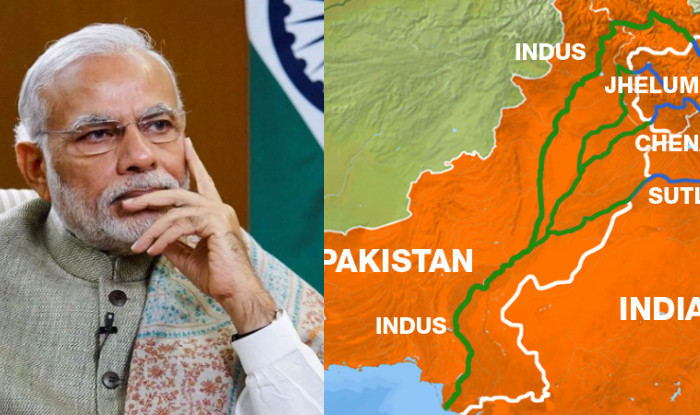The Modi government has constituted a high-level task force to look into how best India can utilize the water it is entitled to under the Indus Waters Treaty.
Instead of scrapping the treaty altogether, the government has decided to exploit it to the hilt while continuing to remain within its purview. This itself is likely to affect Pakistan, considering India has never made optimal use of the treaty before. The task force will be headed by principal secretary to the prime minister Nripendra Mishra, and will have NSA Ajit Doval, foreign secretary Jaishankar and finance secretary Ashok Lavasa as members.
Six rivers flow from India to Pakistan. According to the treaty, India has full right to the waters of the three that flow on the eastern side- Sutlej, Beas and Ravi. But India has to allow unrestricted flow of the other three on the western side- Indus, Chenab and Jhelum. This effectively means that India can use water from the latter three, but strictly in a non-consumptive manner. So far, India has never explored its options when it comes to the western rivers. But more importantly, it has allowed water from the eastern rivers that it is entitled to, to flow into Pakistan. This is likely to come to an end.
The move is part of a larger cycle that Narendra Modi set into motion to deal with India’s hostile neighbour. Modi unlike his predecessors realizes that peace is not an option, because India is dealing with an entity that strives to ferment unrest. This happens due to Pakistan’s civilizational illegitimacy, wherein it constantly feels the need to justify its existence and that of its military’s. Cornering it, disabling it and dismantling it is essential for India.
For Modi, it is another move in a larger game. For India, it is another instance to bask in optimism. For years, intellectuals and experts sitting on armchairs declared that there existed no remedy for evils like corruption and Pakistan. An outsider emerged, demonstrated that their expertise was zilch, and is categorically taking these ills that plague us to the cleaners. The beauty of it is that however populist these moves might be, they are never rash. They come in a timebound and strategic way, produce short but intense shockwaves, and place us one step closer to our objective.
As of now, it is difficult to assess the kind of impact India’s latest move will have on Pakistan. Considering they have received this water which belongs to us for years, it is likely that they utilize it in several ways. Even if India’s move entails to hurting their agricultural sector to a certain extent, it would likely have adverse repercussions across the border. With that, we would have achieved a short-term objective. Our policy has been all about creating fissures at different levels.
The Modi government began dealing with Pakistan using a two-pronged approach.
On one hand, it engaged with the civilian establishment while on the other, it undermined the military establishment. This caused great discomfort to Pakistan because the military establishment is the power behind the throne. By inviting Nawaz Sharif to his inauguration and visiting his mansion on the way back from Afghanistan, Modi was engaging with a democratically elected regime propped up by the military to avoid sanctions. At the same time, every military action against India was being avenged in kind. Firing at the border was always met with disproportionate retaliation, militancy was met with surgical strikes. This conscious inconsistency by India, which was uncharacteristic, confused both establishments across the border. There are indications that this magnified their differences and created a trust deficit between them.
Modi’s greetings to the people of Balochistan and Gilgit Balkistan from the ramparts of the Red Fort was the beginning of another game India is playing simultaneously. This has given impetus to freedom movements in several parts of Pakistan which have been forcibly occupied through the years. With massive support and widespread engagement with India, freedom fighters are organising themselves and preparing to overthrow their occupiers. Whether they achieve their objective successfully or not, this is yet another fissure India has created. As long as we continue to fan the flames of separatism across the border, we will continue to magnify Pakistan’s instability.
The third area wherein we have hit them hard is the economy. Pakistan’s economy has been in the doldrums. Terrorism, the deep-state and widespread instability have made things worse. This has forced them to turn to the Americans with a begging bowl in hand, on an annual basis. Their latest round of begging however, fell to deaf ears for the first time. Clearly the Modi government has lobbied successfully with the Americans, and has got them to stop sponsoring the terrorist state. What India plans to do now vis-à-vis the Indus Water Treaty is a continuation of steps to cripple Pakistan’s economy further.
Ever since Pakistan’s new army chief Qamar Javed Bajwa took over, the ceasefire violations at the border which were a daily occurrence have stopped. It seems as if the man realizes that Narendra Modi is going for the kill, and is making a pathetic attempt to slow down India’s onslaught and buy some time. This won’t work. Narendra Modi realizes that generals and prime ministers will come and go, but Pakistan’s values will continue to be the same. He will keep hitting them where it hurts.
